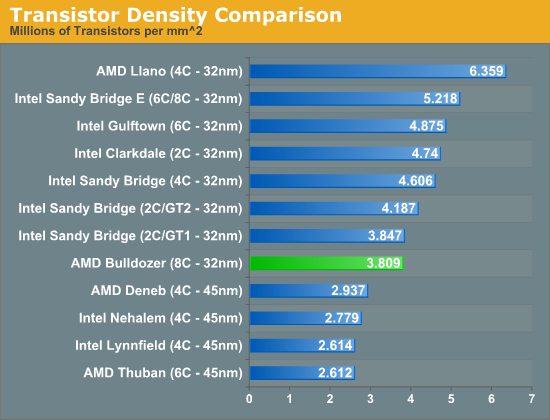AMD Revises Bulldozer Transistor Count: 1.2B, not 2B
by Anand Lal Shimpi on December 2, 2011 2:36 AM ESTThis is a bit unusual. I got an email from AMD PR this week asking me to correct the Bulldozer transistor count in our Sandy Bridge E review. The incorrect number, provided to me (and other reviewers) by AMD PR around 3 months ago was 2 billion transistors. The actual transistor count for Bulldozer is apparently 1.2 billion transistors. I don't have an explanation as to why the original number was wrong, just that the new number has been triple checked by my contact and is indeed right. The total die area for a 4-module/8-core Bulldozer remains correct at 315mm2.
| CPU Specification Comparison | ||||||||
| CPU | Manufacturing Process | Cores | Transistor Count | Die Size | ||||
| AMD Bulldozer 8C | 32nm | 8 |
1.2B |
315mm2 | ||||
| AMD Thuban 6C | 45nm | 6 | 904M | 346mm2 | ||||
| AMD Deneb 4C | 45nm | 4 | 758M | 258mm2 | ||||
| Intel Gulftown 6C | 32nm | 6 | 1.17B | 240mm2 | ||||
| Intel Sandy Bridge E (6C) | 32nm | 6 | 2.27B | 435mm2 | ||||
| Intel Nehalem/Bloomfield 4C | 45nm | 4 | 731M | 263mm2 | ||||
| Intel Sandy Bridge 4C | 32nm | 4 | 995M | 216mm2 | ||||
| Intel Lynnfield 4C | 45nm | 4 | 774M | 296mm2 | ||||
| Intel Clarkdale 2C | 32nm | 2 | 384M | 81mm2 | ||||
| Intel Sandy Bridge 2C (GT1) | 32nm | 2 | 504M | 131mm2 | ||||
| Intel Sandy Bridge 2C (GT2) | 32nm | 2 | 624M | 149mm2 | ||||
Despite the downward revision in Bulldozer's transistor count by 800M, AMD's first high-end 32nm processor still boasts a higher transistor density than any of its 45nm predecessors (as you'd expect):

Transistor density depends on more than just process technology. The design of the chip itself including details like the balance between logic, cache and IO transistors can have a major impact on how compact the die ends up being. Higher transistor densities are generally more desirable to a manufacturer (fewer defects per die, more die per wafer, lower costs), but from the end user's perspective the overall price/performance (and power?) ratio is what ultimately matters.










43 Comments
View All Comments
philosofa - Friday, December 2, 2011 - link
Perhaps it's been down-adjusted to only reflect the transistors (in their automatedly designed topology) that actually do anything - that would probably be the most consistent explanation.SunLord - Friday, December 2, 2011 - link
More then likely the PR people were confused with the 2Billion transistors in the 16 core server parts and have sense been fired for it.MonkeyPaw - Friday, December 2, 2011 - link
Not sure about being fired, but my guess is they just provided some bad info on press release.Maybe the 2B was actually for Trinity with its IGP included?
B3an - Friday, December 2, 2011 - link
If AMD cant do something as simple and tell reviewers the correct transistor count of there CPU then it's no wonder they cant make a CPU that actually performs good. So now, not only is the CPU is an epic fail, but so are the PR department.MonkeyPaw - Friday, December 2, 2011 - link
Relax. Whether it had 2B transistors or it had 2, a press release is nothing to freak out about. And by the way, AMD CPUs are not bad. They are highly reliable and quite fast. What people so often forget is how hard it is to build something this complex and have it function at 99.99999999% reliability. 3.8M transistors per mm^2? People just fail to realize exactly how good we have it, and just how aggressive Intel is with their products now (thanks to AMDs existence).You can get a quad core CPU for $50 today, yet that ain't good enough.
Arnulf - Saturday, December 3, 2011 - link
"You can get a quad core CPU for $50 today, yet that ain't good enough."You can ?
CeriseCogburn - Monday, June 11, 2012 - link
AMD calls it a quadcore, and calls the price $50, but it's only a dual core and the cost is substantially more, but you know how hard it is to get these cpu things correct.... especially for amd fans.SunLord - Friday, December 2, 2011 - link
AMD let go most of it's marketing people and it's PR company around the launch of the FX seriesCeriseCogburn - Monday, June 11, 2012 - link
So the fair and just honest people left, and the gouge their neighbors eyes out dishonest stomp on anyone lying people stayed.Great.
tipoo - Friday, December 2, 2011 - link
I wonder how much money the new design method is saving them, as it certainly isn't as good at producing high performance per watt as the old method of manually designing each transistor. I also wonder if they will go back to the old method of hand tweaking with Bulldozer's successor, maybe they just wanted to get something out the door for now then refine it later, like Phenom I - Phenom II.